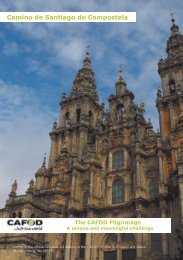Religious Education Curriculum Directory (3-19) - The Catholic ...
Religious Education Curriculum Directory (3-19) - The Catholic ...
Religious Education Curriculum Directory (3-19) - The Catholic ...
- No tags were found...
Create successful ePaper yourself
Turn your PDF publications into a flip-book with our unique Google optimized e-Paper software.
<strong>Catholic</strong> Bishops’ Conference of England and Wales — Department of <strong>Catholic</strong> <strong>Education</strong> and FormationStrandLevel12345678Journeying in reflection andcontemplationPupilsReflect quietly.Participate in periods of reflectionin response to a givenstimulus.Show understanding of the importanceof stillness and quietduring times of reflection andprayer.Demonstrate an appreciation ofthe elements needed for reflectionand contemplation orprayer (places, times, foci, stimuli).Explore how different situationsare conducive to reflectionand contemplation orprayer.Discern how different forms ofreflection and contemplationor prayer can be important inpeople’s lives.Express creatively, linguisticallyor through other media, howreflection and contemplationcan give people insights intotheir own lives and their relationshipswith God.Reflect and analyse with othersdifferent views people hold onthe worth of reflection andcontemplation or prayer.Reflection and contemplationThis strand, formerly part of AT2, is presentedhere separately. This is to emphasisethe point that it will not be subject to assessmentin the same way as other levels of attainment.However, these levels may informthe provision of opportunities for growth inreflection and contemplation.This strand also recognises the significantpart that reflection and contemplation playin the spiritual development of pupils. It contributesto the pupil’s ability ‘to reflect spirituallyand think ethically and theologically’.It is both improper and impossible to assesssuch spiritual development and so this strandsimply marks out the steps that might betaken in terms of progression in reflectionand contemplation. In this way it is more aspirationalthan evaluative and judgemental.Nevertheless real steps may be marked out inways similar to those used in the levels of attainment.However there is a circularityabout this journey which is captured by somelines from the poem Little Gidding:We shall not cease from explorationAnd the end of all our explorationWill be to arrive where we startedAnd know the place for the first time.This thought from T. S. Eliot reminds us of thesense in which ‘reflect quietly’ (L1 & EP) isboth the starting point and the end point ofthe journey. <strong>The</strong> difference is that at EP thewanderer is more fully aware of the journeythat has been made, of all the interveningsteps which have become integrated into thereflection.Above all it is a journey to be relished and delightedin.EPReflect quietly.67
















